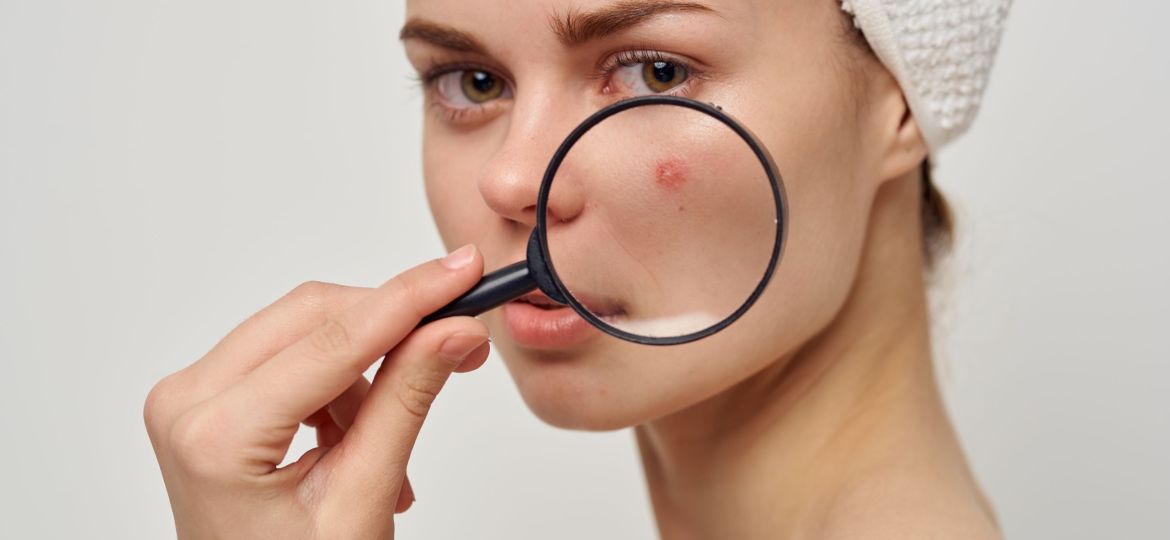
Acne is not a one-size-fits-all condition. Depending on its cause, acne may manifest as occasional pimples or as a more chronic, long-lasting issue. In fact, up to 80% of people will experience acne at some point in their lives. One of the most effective ways to fight acne is to address its root cause. Here are five common causes of acne, along with our tips for eradicating breakouts permanently.
What Causes Acne?
As International Trainer Brian Goodwin explains, acne is an inflammatory skin condition triggered by factors like excess production of sebum, dead skin cells, or harmful bacteria colonizing the skin. To complicate matters, you may be dealing with a combination of these issues. Let’s examine these factors and discuss how they contribute to the appearance of breakouts, blemishes, and more persistent acne:
1. Clogged Pores
Every acne begins the same way: with a clogged pore. Each of our pores contains a hair follicle and a sweat (oil) gland, which play an essential role in skin health. Sweat glands release sebum, a waxy, oily secretion that helps lubricate and soften the skin’s surface. While this is necessary for keeping the skin properly balanced, problems can arise. When sebum moves toward the skin’s surface, it can become trapped by dead skin cells blocking its path. Acne occurs when oil and debris combine with trapped bacteria, causing the infection and inflammation that we call a breakout.
2. Excess Oil Production
Is your skin extra oily? Oily skin is believed to be caused by a genetic tendency to overproduce the hormone dihydrotestosterone (DHT), which causes the skin’s sebaceous glands to produce more sebum. Sebum, while typically seen as an annoyance for oily skin types, plays an important role in maintaining the skin’s moisture barrier and protecting it from harmful environmental elements and microbes. However, when the skin produces too much oil, its pores enlarge and stretch in an attempt to contain the excess. If excess oil becomes trapped, it can mix with dead skin and bacteria that have settled inside the pore, triggering breakouts. The severity of your acne outbreaks can depend on your body’s tendency for excess oil production.
3. Bacteria
Everyone has acne bacteria living on their skin, but not all acne bacteria trigger pimples. According to Medical News Today: “Research suggests that the severity and frequency of acne depend on the strain of bacteria.” The strain of bacteria that contributes to acne is called Propionibacterium acnes, or P. acnes. This bacteria is typically harmless, but under certain conditions (such as in a clogged pore, surrounded by oil and without air), it can trigger an immune response that leads to inflammation of the surrounding tissues.
4. Hormones
Hormones affect acne at all ages, with hormone fluctuations often increasing sebum production and leading to breakouts. Changes in the body’s androgen levels, which are common during puberty, menstrual cycles, or pregnancy, can cause acne. Typically, hormonal acne appears on the lower half of the face, such as along the chin and jawline. It’s no secret that many teens struggle with acne. Teen acne, a type of hormonal acne, is caused by changing hormones affecting sebum production. The key difference is that teen acne is closely linked with adolescence and usually clears up as adulthood begins, explains Brian. Acne that persists past the age of 25 is referred to as persistent acne. Teen acne can appear on the face, neck, chest, and back, while adult acne is more often localized to the face.
As Brian explains, hormonal fluctuations can alter the balance of sebum’s components, such as fats and triglycerides. Furthermore, hormones affect cell turnover rates and the skin’s inflammatory response, leading to clogged pores and potential infections.
5. Genetics
Unfortunately, your genetic makeup often plays a role when it comes to breakouts. Some individuals are genetically more susceptible to their sebaceous glands becoming irritated by hormones, oil, and bacteria. The chances are that if one of your parents had mild to severe acne, you are likely to experience symptoms as well.
Acne Treatment Options
One of the most effective ways to address the causes of acne is with your skincare routine. To keep your skin clear and blemish-free, we recommend using our Acne Advanced 3-Step Treatment System. The products in this innovative collection are designed to treat acne and prevent future breakouts, with results in as little as 28 days.
